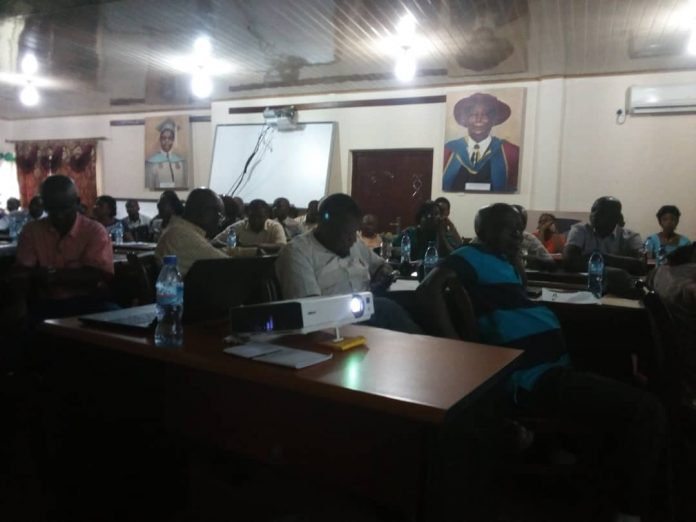By Sumner Kangbap
Dr. Philip John Kanu who happens to be the Acting Principal of the Milton Margai College of Education and Technology (MMCE&T) polytechnic on Wednesday 18th September 2019 officially opened a day’s Quality Assurance Training for both academic and administrative staff at the college’s conference room, Goderich campus at which event he asserted that staff cannot function well if they are not well-grounded in other disciplines. He further informed that he serves as a resource person in leadership, management and human resource trainings in various institutions including Njala University and encouraged the participants to change their focus of knowing all also appealing to them to take advantage of the training opportunity.
He continued that he reads books daily, even when travelling, but lamented that cheating in examinations has become a major problem in the country for which all must bow their heads in shame, that some lecturers sell pamphlets, inflate grades for students and engage in other malpractices articulating that MMCE&T trains teachers and instructors for the country’s middle-level manpower needs disclosing that the resource person, Professor Roney Frazer-Williams, is the leading quality assurance expert in the country and thanked him for accepting the invitation.
According to the Acting Principal, no one individual can change the status quo of the deteriorating standard of education in the country. He said he goes around the college campus to ensure that things are done the right way underscoring “we have to start with ourselves” and reaffirmed that he wants to improve the quality of graduates produced by the college as MMCET is renowned for producing quality teachers.
“In his recent address to the nation on the reopening of schools, President Julius Maada Bio talked tough on examination malpractices. I want to appeal to lecturers to submit their lecture notes to be uploaded on the college’s website. We want to change the approach. The college will establish a Quality Control Unit. I want to succeed, the reason I am open to criticisms. Let’s accommodate each other for quality assurance,” he concluded.
In his PowerPoint presentation, Professor Roney Frazer-Williams of the Chemistry Department, Fourah Bay College, University of Sierra Leone, enlightened that the full attendance of administrative and academic staff at the training means they want to change the status quo, that we are all responsible for the current poor state of education in the country, that his presentation is food for thought and described quality as the totality of features and characteristics of a product or service that bears its ability to satisfy stated or implied needs.
He furthered highlighted the background of the project-Assurance Quality Education in Sierra Leone, the Strategic Partnership for Higher Education, Innovation and Reform (SPHEIR), that few years ago the participating institutions including MMCE&T, Njala University, Freetown Teachers College, University of Sierra Leone, Eastern Polytechnic and the Ernest Bai Koroma University met rotationally to write the proposal to bring quality education to the educational system.
Professor Roney Frazer-Williams continued that 279 countries worldwide applied for the project, that only 27 won including Sierra Leone, that Kings College in the United Kingdom and the University of Illinois in America supported the project with 4 million Pounds Sterling for between 3-5 years, explained that the British Department for International Development (DFID) funded the project through SPHEIR and is managed by the British Council.
“The project is divided into two main phases and aims at creating an enabling environment for the introduction of outcome-based education and moving towards a national qualifications framework supported by complementary quality assurance systems for higher educational institutions in Sierra Leone,” he revealed.
According to Professor Roney Frazer-Williams, the project also aims at supporting the implementation of outcome-based education through strategic curriculum realignment and staff capacity-building observing that most factories in the country complain about the poor graduates produced by universities, the reason they employ foreigners.
Other objectives of the project are stakeholders’ engagement on quality assurance, ensure relevance of curriculum and skills of graduates to key sectors, develop employer engagement strategies across academic clusters and focus on smallholder inputs into higher education system.
Key outputs of the project are post-graduate Diploma in Quality Assurance, outline national qualifications framework and manual, pilot learning management system, improve faculty training, new assessment methods, investment in academic programs and provision of internet facilities and office equipment.
He also underlined that quality assurance training demands accountability from stakeholders, response to globalization changes, global labor market, advanced information technologies, demographic changes, that higher educational institutions are now run like businesses and no longer the traditional way underscoring that only institutions that excel attract funding.
The lead facilitator concluded that in most countries, quality assurance is a prerequisite for accreditation of their programs and institutions that increased enrollment comes with quality challenges and that some major industries give contracts to universities to train their workers.
Earlier, the college’s Registrar, Mr. Sheriffu Bangura, welcomed all to the training.
The PowerPoint presentation was handed over to the Acting Principal for distribution to interested persons.
The question and answer session climaxed the training while the vote of thanks was rendered by Ms. Elizabeth Taylor-Morgan of the Education Department.




